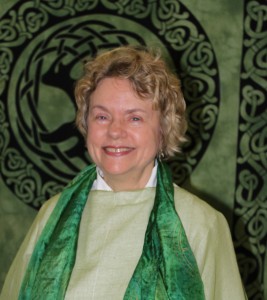Changing Church: Rev. Judith Liro, Priest, St. Hildegard’s Community, St. George’s Episcopal Church, Austin, Texas

Ancient Love, Vibrant Life-giver,
Stir compassion in us,
Longings in our heart and action:
For our own bodies and for all bodies,
For the Earth fallen prey to robbers,
For Half-the-sky passed by.
Seated in a large circle with members of St. Hildegard’s Community, Rev. Judith Liro leads this prayer she created. This worship service also includes two songs by Carolyn McDade. “This Ancient Love” includes these words: “Long before She laid her arm of colors ‘cross the sky, there was a love, this ancient love was born”; and “O Beautiful Gaia” images the Divine as “Ancient Sophia.” After the Eucharist, we sing a version of the “Prayer of Jesus,” entitled “Ground of All Being,” by J. Philip Newell, balancing the images of “Mother of life” and “Father of the universe.”
In her sermon, based on Jesus’ parable of the Good Samaritan, Rev. Liro picks up the image of “Half-the-sky” from her prayer. Alluding to the title of a book by Nicholas Kristof and Sheryl WuDunn, Rev. Liro uses “Half-the-sky” as a symbol for the women of the world. According to a Chinese Proverb, “women hold up half the sky.” In Rev. Liro’s creative interpretation of the Good Samaritan parable the injured one represents the women of the world, as well as the Earth and our own bodies. Rev. Liro illustrates both the “worldwide oppression and empowerment of women” from the book by Kristof and WuDunn. “My three examples—our bodies, the Earth, and women of the world—are connected,” she says. “It is patriarchal ordering and values that have demeaned them all, setting them up for exploitation. Jesus didn’t know the word ‘patriarchy,’ but his parable shows that he was well aware of the brokenness to the human family when artificial lines of value, domination, and exclusion are drawn. He calls us to kinship and friendship and community with ourselves and with each other, with Divine Love and the web of Life.”
After the liturgy Rev. Liro comments: “For me feminism is about a healthy balance of feminine and masculine and is not anti-male. It encourages both men and women to embrace their wholeness. Our hope is for all of us to know full humanity that comes from living in deep connection with God’s wholeness. Liberating God from narrow metaphors opens up new possibilities for divine-human relationship. I believe that ‘half-the-sky passed by’ applies to our naming of the Divine as well. God is the injured One imprisoned in the narrowness of our naming and understanding. Often St. Hildegard’s uses diverse divine images that are gender-neutral. At other times we intentionally pray with feminine names such as ‘Sophia’ to balance the male images that most of us carry around already. We experience tremendous vitality brought by this wholeness.”
Rev. Liro wrote a parable to emphasize the “indifference of the Church toward the pervasive masculine language in our liturgies by showing how offensive and unacceptable a comparable racial marker would be”:
Once there was a major religion whose Holy Scriptures having been formed in racist cultures contained explicit markers of a racial nature upon the Divine Name. In the Bible, the Book of Common Prayer, and The Hymnal 1982 God’s name was often preceded by the adjective “white” that was usually capitalized. In the Beatitudes Jesus proclaimed, “Blessed are the pure in heart, for they shall see White God.” One of the most beloved Psalms frequently read aloud in the Burial Office said, “White God makes me lie down in green pastures and leads me beside still waters.” The Collect for ordinations began “O White God of unchangeable power and eternal light” and the first line of Hymn 680 rejoiced “White God our help in ages past.” And God-of-all colors-and no-color, being grieved at this diminishment and seeing how creation perceived through this misshapen lens was likewise diminished, sent prophets to awaken and liberate the faithful people. And most people said it really wasn’t a problem. Everyone knew that God wasn’t really white.
Another powerful metaphor Rev. Liro uses to advocate for inclusion of female divine images in the language of liturgy is this: “I like the useful metaphor of several factories that are built on a river and pollute the water of a village downstream. A hospital is built to treat the illnesses that result, but there is still a need to track down the source of the pollution and to clean up the water itself. Many organizations including the Church do the important work of the hospital. Yet I have also come to realize that the Church is one of the factories that contribute to the problem. Our liturgical language with its current, heavily masculine content supports a patriarchal hierarchical ordering. It often contradicts the life of our parishes that are more balanced. Having ordained women serving has helped make us more whole. A woman Presiding Bishop bringing loving wisdom—a couple of years ago it seemed unthinkable. . . . And yet the language hasn’t caught up. Most are simply unaware of the power of language. The status quo that includes the exploitation of the Earth, poverty, racism, sexism, heterosexism, militarism. . . is held in place by a deep symbolic imbalance, and we are unwitting participants in it. ” Rev. Liro says that she is grateful for those working in the Episcopal Church to write and officially adopt expansive language resources and hopes that St. Hildegard’s creations can contribute to these resources for wider use.
“St. Hildegard’s Community has come about through Sophia’s grace. Sophia-Spirit is creating a welcoming, healing, justice-nurturing place as She dances with us and weaves our lives together. Our life is in God’s hands, and we live sustained by Her breath and energy.”
To read more of Rev. Judith Liro’s story, see: https://wipfandstock.com/store/Changing_Church_Stories_of_Liberating_Ministers
I also highly recommend this website for continuing news about the transforming, liberating ministry of Rev. Judith Liro and St. Hildegard’s Community: http://www.hildegard-austin.org/